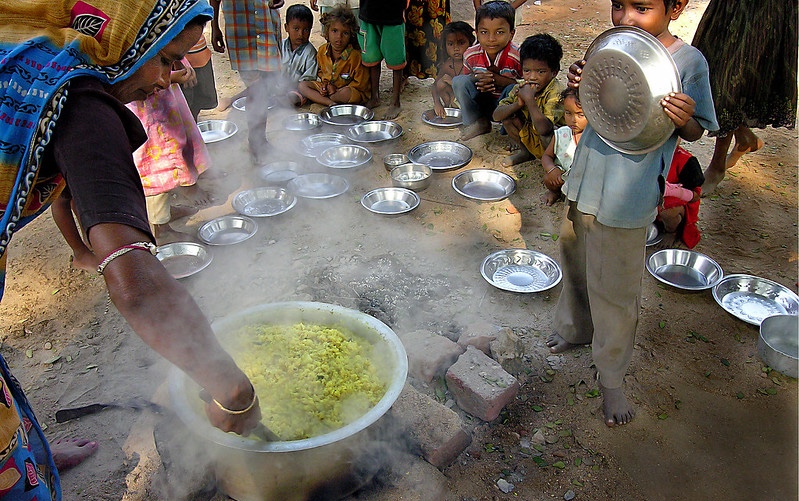By April 2020, schools in 170 countries were closed to curtail COVID-19 transmission. In India, 247 million children have been out of the classroom for over a year. Beyond the devastating consequences school closures are having on learning, health experts are particularly concerned about vulnerable Indian children missing out on the free lunch they receive at school. The findings of our new paper in Nature Communications suggest that the current disruption of India’s school feeding program could have consequences for the next generation of children as well.
In the first-ever rigorous evaluation of the impact a school feeding program has on the next generation, our research demonstrates India’s free school meals program is associated with better growth outcomes in the children of those who participated in the program as children themselves. This suggests such programs generate benefits well beyond the health and well-being of beneficiaries.
Today, India has the world’s highest number of undernourished children and the largest school feeding program, the Mid-Day Meal (MDM) scheme. Undernourishment, and particularly stunting (being short for one’s age), is a marker of suboptimal conditions early in life and is associated with poor life outcomes such as lower productivity and earnings and higher incidence of chronic diseases. Many studies have shown that school feeding programs can combat hunger and support children’s education and long-term well-being. School meals are especially beneficial for girls, incentivizing their staying in school longer, postponing marriage and lowering the chances of teen pregnancies, all of which are, unfortunately, still common in South Asia and have negative consequences for the nutrition of girls and their children.
But what we have not known until now is whether the nutrition benefits of school feeding programs carry over to the next generation.
India’s MDM scheme was launched in 1995; thus its early beneficiaries are now of childbearing age. We hypothesized that women who received free meals when they were children in primary school would be better nourished and more educated as adults, and consequently would have children with improved linear growth. A first look at the data supported our hypothesis: stunting prevalence in 2016 was lower in states where more girls received free meals in school in 2005 (see figure).
Our research shows that this observed association between MDM and future stunting holds when tested with rigorous statistical models using nationally representative data from 1993 to 2016.
Our three key findings were:
- At 5 years of age, the average healthy child by World Health Organization standards is 110 cm tall, while a stunted child is 100 cm or shorter. Our statistical models that accounted for biasing factors suggest that from one generation to the next, MDM can help recover approximately 2-3 cm of child height deficit.
- To put these effects into perspective, our models estimated that 29% of the improvement in height-for-age z-scores (HAZ) from 2006 to 2016 was explained by the MDM.
- These findings are supported by program pathway analysis showing that MDM beneficiaries have more years of education, are taller, give birth later and have fewer children, and are more likely to use health services compared to non-beneficiaries.
These findings indicate that, when intergenerational effects are considered, the complete benefit of school feeding programs for nutrition is much larger than previously understood. Their power is that they address many fundamental drivers of undernutrition in a large segment of the population during childhood, a period of high nutritional needs.
Extending such programs into and beyond middle school and improving the quantity and/or quality of meals provided may further enhance their benefits. Program expansion has substantial financial implications, but the multigenerational benefits likely outweigh the costs, as both education and nutrition improvements are important societal needs. Many exciting initiatives to improve school meals are currently underway in India including: School gardens, breakfast meals, provision of eggs, micronutrient fortification of food staples, and integration of nutrition and hygiene education. Evidence of the impact and relative benefit of these initiatives is limited, demanding further evaluation, but such efforts to deepen and expand the impact of school meals should be welcomed, given their broad benefits. A learning agenda that explores the multiple contributions of expanding program coverage and improving meal quality can help ensure impact and cost-effectiveness. Bringing stakeholders together to co-create this learning agenda is critical as schools reopen and as India seeks to ensure that the millions of school-aged children continue to get the nutrition they need to lead healthy and productive lives.
Suman Chakrabarti is a PhD candidate at the University of Washington; Samuel Scott is a Research Fellow with IFPRI’s Poverty Health and Nutrition Division (PHND) based in New Delhi; Harold Alderman is a PHND Senior Research Fellow; Daniel Gilligan is PHND Deputy Director; Purnima Menon is a PHND Senior Research Fellow based in New Delhi.
This work was supported by the Bill & Melinda Gates Foundation through the IFPRI-led Partnerships and Opportunities to Strengthen and Harmonize Actions for Nutrition in India (POSHAN),







